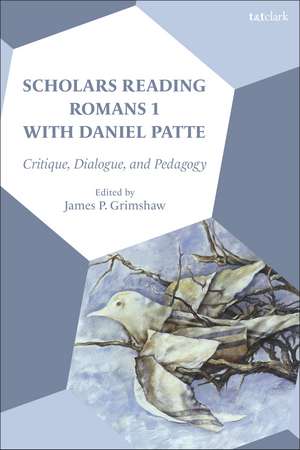Scholars Reading Romans 1 with Daniel Patte: Critique, Dialogue, and Pedagogy
Editat de Dr James P. Grimshawen Limba Engleză Paperback – 20 mar 2024
| Toate formatele și edițiile | Preț | Express |
|---|---|---|
| Paperback (1) | 189.61 lei 6-8 săpt. | |
| Bloomsbury Publishing – 20 mar 2024 | 189.61 lei 6-8 săpt. | |
| Hardback (1) | 538.09 lei 6-8 săpt. | |
| Bloomsbury Publishing – 21 sep 2022 | 538.09 lei 6-8 săpt. |
Preț: 189.61 lei
Preț vechi: 248.43 lei
-24% Nou
Puncte Express: 284
Preț estimativ în valută:
36.28€ • 37.88$ • 30.03£
36.28€ • 37.88$ • 30.03£
Carte tipărită la comandă
Livrare economică 05-19 aprilie
Preluare comenzi: 021 569.72.76
Specificații
ISBN-13: 9780567704023
ISBN-10: 0567704025
Pagini: 176
Dimensiuni: 156 x 234 x 25 mm
Greutate: 0.25 kg
Editura: Bloomsbury Publishing
Colecția T&T Clark
Locul publicării:London, United Kingdom
ISBN-10: 0567704025
Pagini: 176
Dimensiuni: 156 x 234 x 25 mm
Greutate: 0.25 kg
Editura: Bloomsbury Publishing
Colecția T&T Clark
Locul publicării:London, United Kingdom
Caracteristici
Provides a roadmap on doing joint research with social scientists on Romans 1:26-27 and public policy and on how to use a study on the history of reception in the classroom
Notă biografică
James P. Grimshaw is Associate Professor of Religion at Carroll University, USA.
Cuprins
Notes on Contributors Introduction James P. Grimshaw Part I: Overview 1: Can One Really Be an Exegete and Claim that All Exegeses are Equally Legitimate - Timothy Gombis, Independent Scholar, USA 2: Three Commentaries, One Author: One Author Shaped by History and Culture - Robert L. Brawley, McCormick Theological Seminary, USA Part II: Methodology and Ethical Responsibility 3: Ethical Responsibility and the Necessity to Choose Among a Plurality of Equally Legitimate and Plausible Interpretations - Kathy Ehrensperger, University of Potsdam, Germany 4: Unending Interpretations: Continuing the Conversation - Tat-siong Benny Liew, College of the Holy Cross, USA 5: The Collision of Adverse Opinions: A Reflection on Daniel Patte, John Stuart Mill, and the Absolutization of Certainty - Monya A. Stubbs, Chicago Theological Seminary, USA 6: Can We Live With Romans After Auschwitz? - Gary A. Phillips, Wabash College, USAPart III: Romans 1:16-18 and 1:26-27 7: A Chinese Cross-Cultural Reading of "d??a??s??? ?e??" In Romans 1:17: A Plausible Fourth Exegesis in Conversation With Daniel Patte - K. K. Yeo, Garrett-Evangelical Theological Seminary, USA 8: A Historical Analysis of Daniel Patte's Strategies and Ethics of Reading With a Focus on Romans 1:16-18 and 1:26-27 - Bernadette J. Brooten, Brandeis University, USA Part IV: Future Application and Past Influence 9: Patte's Romans in the Classroom: Can the Introduction and Chapter 1 Provide Students an Entrée into Postmodern Hermeneutic Theory and Practice? - John Jones, La Sierra University, USA 10: The Taproot of My Perception of Romans as Necessarily Multivalent and Contextual - Daniel Patte, Vanderbilt University, USA References Author Index
Recenzii
Outside the field of biblical exegesis, it may seem strange that so much can be written on one single chapter of a biblical book. However, in churches and the ecumenical movement this mirrors daily experience. We share the Bible, interpretations differ. This can lead to conflict, but also to insights with implications for interreligious and cross-cultural settings. Daniel Patte has dedicated his work to the pluralism of readings. He has described the complex process of interpretation, engaging students and colleagues all over the globe. This book is an accessible resource for a wide audience to take part in the conversation.
How scholars interpret the Bible does matter! Our interpretations do bring life or death to people. Faced with such a heavy responsibility, Daniel Patte and his respondents foreground the effects of heritage and history of reception on interpretations, and make explicit the process of interpretation - namely, the textual-analytical, hermeneutical, and contextual choices that one privileges - so that we can become self-critical and avoid absolutizing any interpretation. Highlighting a Ricoeurean sense of "conflicts of interpretations," the chapters in this book insist on how critical biblical interpretations should embody loving God and loving others in people's concrete conditions of existence.
Interpretation of scripture is serious work, as it has a real impact in the world beyond the faith communities that produce and receive those interpretations. For three decades, Daniel Patte has called on biblical interpreters to understand this ethical imperative in their interpretative choices. These scholars in turn take his interpretation seriously, by holding him to account for its potential effects. The breadth of perspectives they bring makes this book an excellent resource for those preparing to become responsible biblical interpreters, and for ministers who wish to gain insights into the developments in biblical studies in the decades since their formal theological education.
How scholars interpret the Bible does matter! Our interpretations do bring life or death to people. Faced with such a heavy responsibility, Daniel Patte and his respondents foreground the effects of heritage and history of reception on interpretations, and make explicit the process of interpretation - namely, the textual-analytical, hermeneutical, and contextual choices that one privileges - so that we can become self-critical and avoid absolutizing any interpretation. Highlighting a Ricoeurean sense of "conflicts of interpretations," the chapters in this book insist on how critical biblical interpretations should embody loving God and loving others in people's concrete conditions of existence.
Interpretation of scripture is serious work, as it has a real impact in the world beyond the faith communities that produce and receive those interpretations. For three decades, Daniel Patte has called on biblical interpreters to understand this ethical imperative in their interpretative choices. These scholars in turn take his interpretation seriously, by holding him to account for its potential effects. The breadth of perspectives they bring makes this book an excellent resource for those preparing to become responsible biblical interpreters, and for ministers who wish to gain insights into the developments in biblical studies in the decades since their formal theological education.
